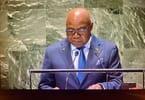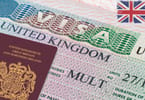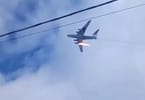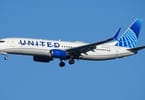British Airways Plc won’t budge from its strategy of focusing on premium travel even as the recession saps demand for its most lucrative services across the North Atlantic, the carrier’s U.S. chief said.
Business-class only flights between London’s City Airport and New York start in September and a promotion begins today offering U.S. executives free travel to Europe to publicize their companies, Simon Talling-Smith, executive vice president for the Americas, said in an interview.
“We will continue to position ourselves as a premium airline — that is absolutely core to our business model,” Talling-Smith said yesterday from New York, where he is based. “There is an ongoing demand for business travel and that isn’t going to go away.”
Premium traffic at BA has fallen for 10 straight months, with June’s near 15 percent decline comparing with a slide of 1.3 percent in economy-class sales. The drop led to a record 375 million-pound ($611 million) loss in the year ended March 31 and has prompted Chief Executive Officer Willie Walsh to risk a strike this summer as he seeks almost 4,000 job cuts.
British Airways hasn’t sold out its initial flights between London City and New York John F. Kennedy International Airport, Talling-Smith said. He declined to reveal the likely load factor, while saying the airline is “pretty confident” that demand will increase as the Sept. 29 start date nears.
‘Still Confident’
“Our biggest customers are telling us that they are very interested,” said the executive, who has worked for the carrier for 18 years. “We’re still confident we will make a good return on that flight.”
A return to pre-recession traffic levels matching those of 2007 probably will take five years, Talling-Smith said in the interview. Airline industry losses this year may total $9 billion, according to a June 8 forecast from the International Air Transport Association.
London-based British Airways is more exposed to premium markets after reducing its network to 148 cities as of March compared with 168 a decade ago as it seeks to provide a maximum number of daily frequencies to busier destinations.
BA is utilizing some of its excess aircraft capacity to promote premium-class services to U.S. business people through its “Face-to-Face” competition, which offers free European trips on three special flights carrying 1,000 people.
“One of the only benefits of the economic climate is that we have quite a lot of empty seats and a few spare aircraft, so the cost of the promotion is pretty small,” Talling-Smith said.
500-Word Essay
An advisory panel will assess the free-flight requests, which require entrants to complete an online form and 500-word essay on the value they would reap from an overseas trip.
Walsh will address BA’s annual shareholder meeting today as the company continues talks with unions over job and pay cuts that the CEO says are needed to survive the slump.
The airline called in the government-funded Advisory, Conciliation and Arbitration Service to chair talks with representatives of 22,000 cabin crew and ground staff after the failure of four weeks of direct negotiations pushed it toward the first major dispute involving directly employed workers since 1997.
Mick Rix, the leader of the GMB union, told Bloomberg Television that the two sides are still talking.
“The company has made a demand that many of our member have to accept permanent change, cuts in their terms and conditions, and yet the leadership of this company that are very highly paid have not made those same sacrifices,” Rix said today in the interview.
Strike Costs
A strike would cost British Airways about 25 million pounds a day, Doug McNeil, an analyst at Astaire Securities in London, said on Bloomberg TV. That has to be seen in the context of the company’s 1 billion-pound cash reserves, said McNeil, who has a “buy” recommendation on the stock.
British Airways rose for a fourth day in London trading and was priced up 3.2 pence, or 2.5 percent, at 129.8 pence as of 9:55 a.m. That pares the stock’s decline this year to 28 percent and values the company at 1.5 billion pounds.
BA shares rose yesterday and the cost of protecting its bonds against default fell after the Observer newspaper said July 12 that investors had backed plans to raise cash through a share sale after meeting with Walsh last month.
Europe’s third-largest airline had its credit rating lowered to Ba3, three levels below investment grade, by Moody’s Investors Service on July 9, the third cut this year.
WHAT TO TAKE AWAY FROM THIS ARTICLE:
- London-based British Airways is more exposed to premium markets after reducing its network to 148 cities as of March compared with 168 a decade ago as it seeks to provide a maximum number of daily frequencies to busier destinations.
- “One of the only benefits of the economic climate is that we have quite a lot of empty seats and a few spare aircraft, so the cost of the promotion is pretty small,” Talling-Smith said.
- “The company has made a demand that many of our member have to accept permanent change, cuts in their terms and conditions, and yet the leadership of this company that are very highly paid have not made those same sacrifices,” Rix said today in the interview.






















